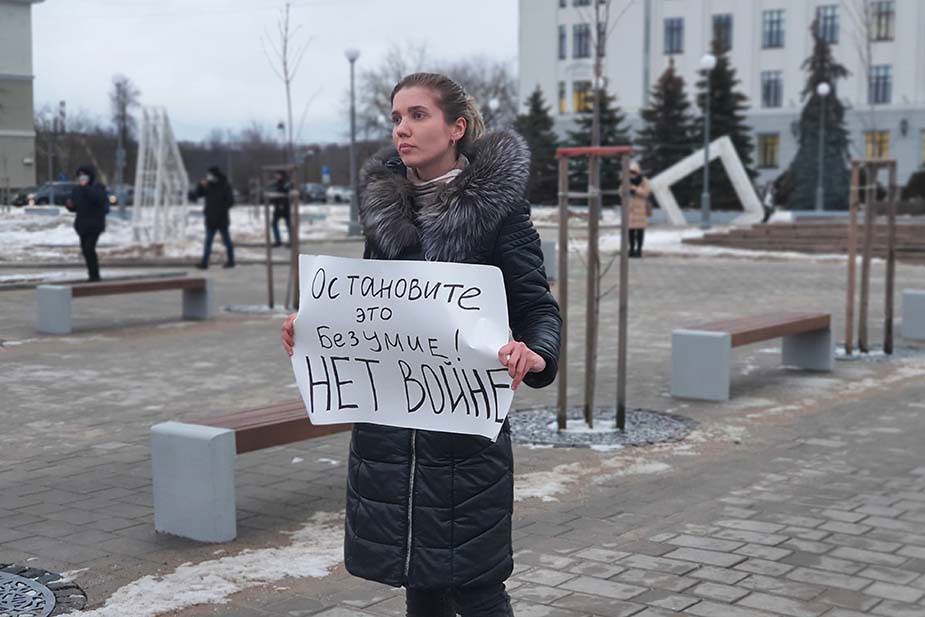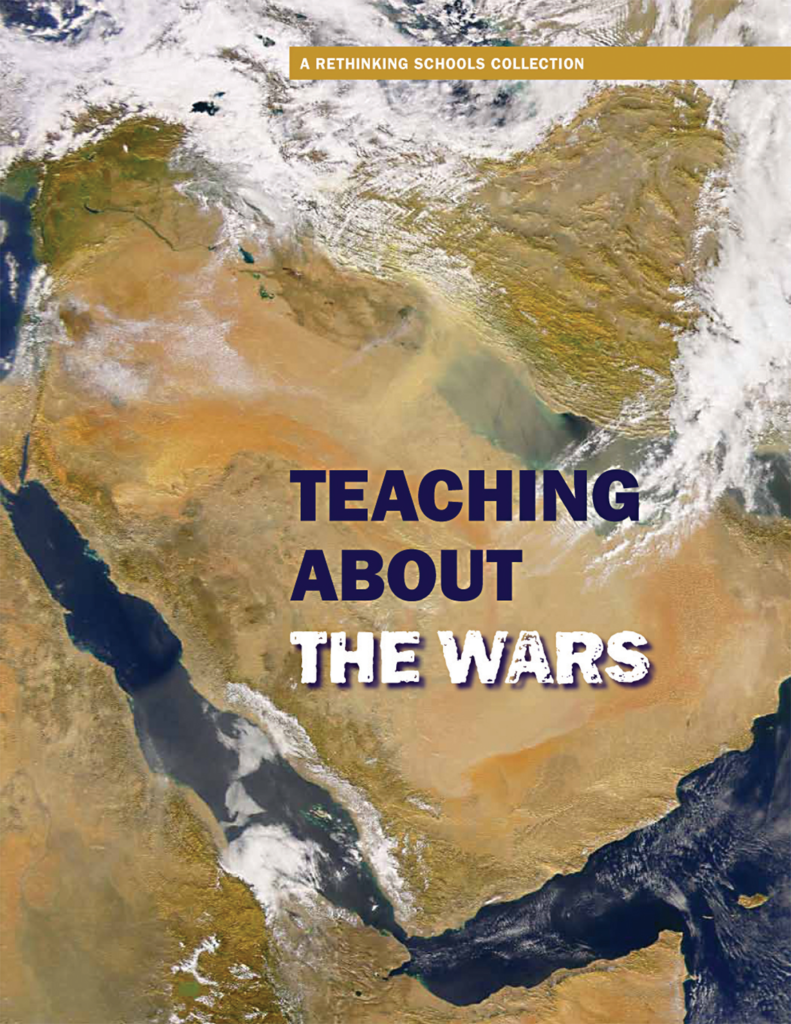
Her placard reads: “Stop this madness! No war!” Photo: Nikolai Kuzmin. Courtesy of 7×7
In his sadly timeless song “Masters of War,” Bob Dylan sang:
You fasten all the triggers
For the others to fire
Then you sit back and watch
When the death count gets higher
Indeed, the heartbreaking death count in Ukraine climbs higher and higher. But those who “fasten all the triggers” are not the ones to suffer. The great socialist leader, Eugene V. Debs, said the same thing back in 1918, opposing U.S. involvement in World War One: “The master class has always declared the wars; the subject class has always fought the battles.” This speech earned Debs a 10-year sentence for allegedly violating the U.S. Espionage Act.
Thanks to all of you who shared teaching resources with us on the Russian invasion of Ukraine. We appreciate the compassion and imagination of so many educators. We want to share a few of the resources that people sent us.
A number of you confirmed our recommendation of the daily news program, Democracy Now!, which offers an important alternative to mainstream media coverage of world events, including the Ukraine invasion.
A Bellingham, Washington, elementary teacher graciously shared a slideshow that she put together for her students. It includes the moving song by the Ukrainian Chorus of New York, which recently opened an episode of Saturday Night Live.
For decades, the Morningside Center for Teaching Social Responsibility in New York City has been an important source of teaching resources. Here are thoughts on teaching “Russia’s Invasion of Ukraine,” by Marieke van Woerkom.
One teacher wrote to recommend IraqiGirl: Diary of a Teenage Girl in Iraq, published by our friends at Haymarket Books. He wrote: “This is an excellent book with first-person accounts of a young person’s experiences at war during the U.S. invasion in early 2003. It is also just a good reference to encourage us to ask, ‘What are young people in Ukraine experiencing right now and how might they be sharing their experiences with the world?’” And, as we mentioned in a previous email, our full Rethinking Schools book, Teaching About the Wars, is available for free download at our website.
The Educators Institute for Human Rights has published two flyers with a number of valuable resources for teachers at various grade levels. Here is the most recent.
An educator with Musical Media for Education wrote to recommend “He Is Not Back from the War,” a Soviet-era antiwar song by Vladimir Vysotsky that underscores war’s impact on “survivors” — “It is I who is not back from the war.” Of course, now would be an excellent time to share other anti-war, peace and justice songs with students — like Edwin Starr’s classic, “War (What Is It Good For?).” Another teacher recommended the lovely Yusuf/Cat Stevens “Playing for Change” video of “Peace Train.” Trains are not always metaphors of peace, but a 4th- and 5th-grade teacher shared on Facebook that she asked her students why the train metaphor is used in a song about peace, and listed their hopeful responses: “Trains are powerful — a force.” “They stay on track — they reach the goal. There’s no detours.” “Sometimes trains go through darkness (tunnels) but there’s light ahead.” “Every train car can carry different resources, just like people.”
Are you familiar with Daniel Denvir’s podcast, The Dig? It offers in-depth interviews on key social justice concerns. A recent interview was with Tony Wood, author of Russia Without Putin, among other titles, who discusses Russia’s motives for invasion, as well as U.S. and NATO strategy in the area.
When it comes to allowing teachers to teach the truth, Putin is working from the same playbook as the right wing in the United States — pressing a mandatory curriculum of disinformation. As described by Human Rights Watch, the government provides teachers a script they must share with students telling them that Russia invaded Ukraine because “our policy is freedom, freedom of choice for everyone to independently determine their own future and the future of their children.”
But some teachers refuse to go along. Here is an interview with Irina Milyutina, a teacher of conscience in Pskov, Russia, who joined with other teachers in signing a petition against the war, has publicly demonstrated against the war, and movingly explains her resistance. That petition had been signed by more than 5,000 Russian teachers before it was taken down. It said plainly: “We support anti-war protests and demand an immediate ceasefire.” See details at People and Nature, including an open letter from Ukrainian headmaster Igor Tsyvgintsev — an eloquent, searing denunciation of the Russian invasion and those “educated” Russians who support it.
As social justice educators, we seek to nurture our students’ empathy; encourage them to surface questions and help them gain a broader historical context within which to locate this war; reflect on ways we can express solidarity with those resisting invasion and occupation, as well as those fleeing the war; and find ways to care for our students and for each other during this frightening time.
As Ukrainian educator Igor Tsyvgintsev reminds us, “The entire curriculum of school studies comes down to humaneness.”
Again, thank you for sharing your teaching thoughts and resources on Russia’s war in Ukraine.

